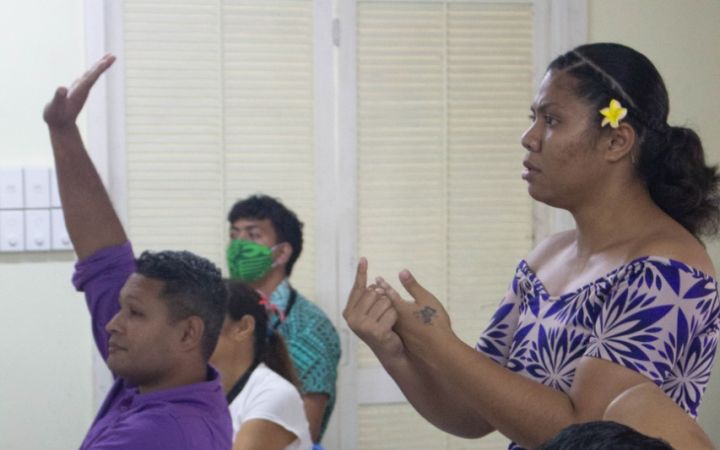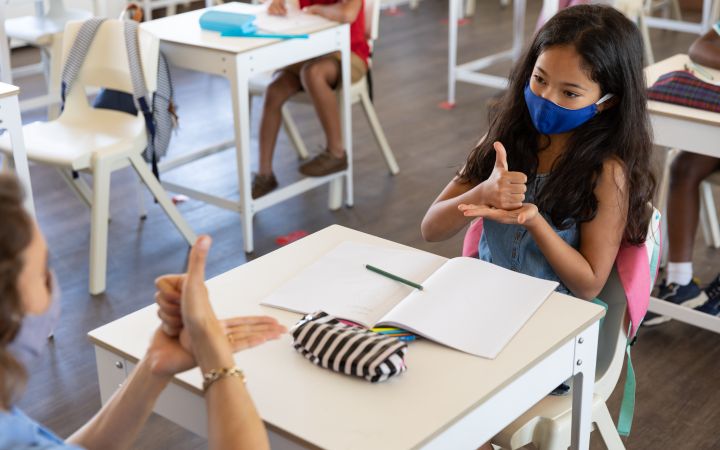September 2022, Hiroshima, Japan – So much of the world’s information is available through reading, speaking or listening. But what if those channels aren't available to you? What if the language you use isn’t spoken or written?
Accessibility for people with disabilities is one of the goals of the 2030 Agenda. According to the World Health Organization, more than 1 billion people around the world live with some form of disability, and this number continues to increase. In fact, almost everyone will temporarily or permanently experience disability at some point in their life.
Yet, disability inclusion lags around the world. Even as advances in artificial intelligence and technology ease communication across languages and media, many communities confront fundamental barriers to communication. In Samoa, for example, deaf communities face low literacy levels as well as a scarcity of sign language interpreters. There is ample scope to improve and scale up accessible, quality services that allow everyone, including people with disabilities, to lead full lives and shape their societies.
Communication in Samoa: a Question of Accessibility
UNITAR is learning and seeking to improve in this area. When Maselina Iuta – founding member and project officer for the Deaf Association of Samoa – joined the UNITAR Tsunami-based Disaster Risk Reduction (DRR) Programme, she showed us just how important it is to create accessible learning spaces.
The DRR Programme, developed and run by UNITAR Division for Prosperity, equips changemakers like Maselina with knowledge and skills to implement inclusive disaster risk reduction. Maselina joined the programme so she could better ensure that people with disabilities in Samoa are included in disaster management.
Maselina, herself deaf, was supported through the programme with sign language interpretation by Annika Tierney Lemisio, disaster preparedness and response coordinator for Nuanua O Le Alofa (a disability advocacy organization in Samoa).
Working with a trusted colleague like Annika who uses the same sign language (like any language, different sign languages are used around the world) allowed Maselina to engage with the programme, interact with fellow participants and share her ideas.
Teaching Sign Language For Inclusivity
While Maselina may have learned new ideas and skills in the UNITAR programme, her contributions to her fellow learners, the programme and UNITAR were immeasurable. Her group’s final presentation stood out: it included a strong focus on disabilities and was presented with sign language. Maselina also taught UNITAR the power of sign-language interpretation to unlock meaningful discussion, diversity of thought, and greater inclusivity.
UNITAR recognizes our responsibility to expand the scope and accessibility of our programmes, enhance inclusivity, and secure learning opportunities across languages and local contexts. Over the years, the DRR Programme has been exploring with the Pacific Disability Forum how we may collaborate, and we make an effort to provide accommodations for participants who need them. Our programmes also seek to gather as diverse a group of learners as possible. Such diversity teaches participants how to listen to and understand differing opinions and experiences – key leadership skills.
UNITAR is eager to learn from participants from diverse backgrounds and languages, so we can provide learning solutions that better promote representation and inclusion and meet the needs of participants and communities.
About UNITAR
The United Nations Institute for Training and Research (UNITAR) is a dedicated training arm of the United Nations. In 2021, UNITAR trained 370,139 learners around the world to support their actions for a better future.
One of the eight divisions of UNITAR, the Division for Prosperity seeks to shape an inclusive, sustainable and prosperous world. We empower individuals from developing countries – especially women and young people – to address inequalities. Our alumni are making a difference in least-developed countries, countries emerging from conflict, and small island developing states.
The UNITAR Hiroshima Women’s Leadership in Tsunami-based Disaster Risk Reduction (DRR) Training Programme for World Tsunami Awareness Day was first launched in 2016 in collaboration with the United Nations Office for Disaster Risk Reduction (UNDRR). The programme targets women from around the world but particularly those living or from Pacific SIDS. The UNITAR Hiroshima Office, echoing the Government of Japan, underscored that a gender-focused perspective to DRR. The Programme aims to “help focus attention on the distinct gender-specific capacities and vulnerabilities to prevent, prepare, confront, and recover from disasters.”



